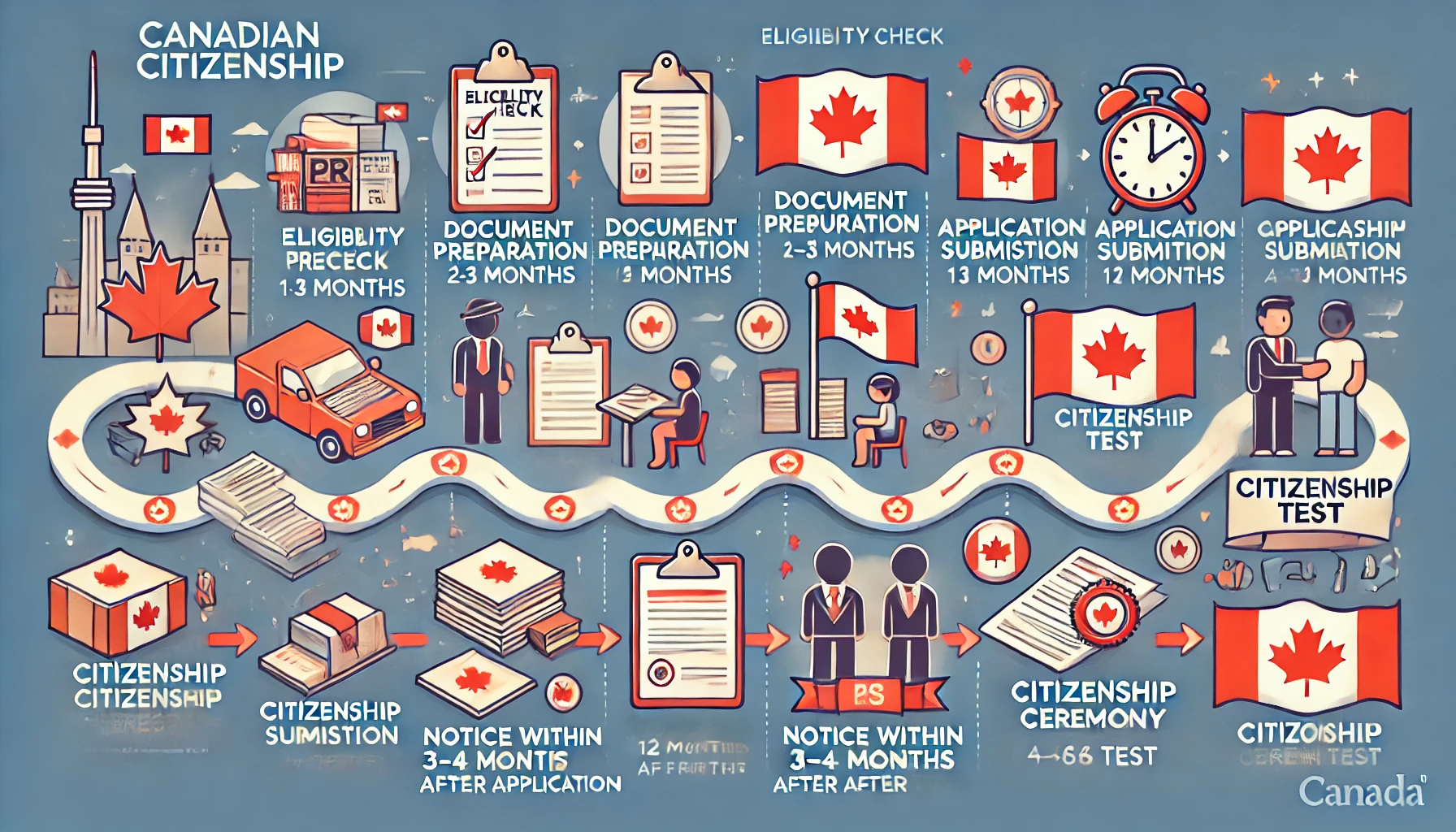The timeline to obtain Canadian citizenship after becoming a Permanent Resident (PR) involves several steps and requirements. Here’s a detailed breakdown of the process and the time it typically takes:
Steps to Canadian Citizenship
1. Meeting Residency Requirements
- Physical Presence: You must have been physically present in Canada for at least 1,095 days (three years) within the five years immediately before the date you sign your application. It’s advisable to apply with more than 1,095 days to account for any miscalculations.
- Time as a PR: Only the time spent in Canada as a Permanent Resident counts towards the 1,095 days. Any time spent in Canada before obtaining PR status does not count.
2. Filing Taxes
- You must have filed your taxes for at least three out of the last five years, if required under the Income Tax Act. This demonstrates your residency and ties to Canada.
3. Language Proficiency
- If you are between 18 and 54 years old, you must provide proof of proficiency in English or French. This can include results from an approved language test, proof of completion of secondary or post-secondary education in English or French, or other approved documentation.
4. Applying for Citizenship
- Application Preparation: Gathering required documents, completing the application form (CIT 0002), and paying the application fee.
- Application Submission: Submitting the application to Immigration, Refugees and Citizenship Canada (IRCC). Using a courier service is recommended to track your application.
Processing Time
1. Application Acknowledgment
- Acknowledgment of Receipt (AOR): Once IRCC receives your application, they will send you an acknowledgment of receipt (AOR). This usually takes a few weeks to a few months.
2. Application Processing
- Processing Time: As of now, the typical processing time for a citizenship application is around 12 months. However, this can vary depending on factors such as the volume of applications, completeness of your application, and whether any additional information or documents are needed.
3. Citizenship Test and Interview
- Test Scheduling: If you are between 18 and 54 years old, you will be scheduled to take the citizenship test. This usually happens within a few months of receiving the AOR.
- Interview: You may also have an interview with a citizenship official to assess your application and knowledge of Canada.
4. Decision
- Approval: After passing the test and interview, and once all other requirements are met, IRCC will make a decision on your application.
- Notification: If approved, you will receive a notification and an invitation to attend a citizenship ceremony.
5. Citizenship Ceremony
- Scheduling: The ceremony typically takes place within a few months of your application being approved. Due to COVID-19, some ceremonies might be held virtually.
- Oath of Citizenship: At the ceremony, you will take the Oath of Citizenship, officially becoming a Canadian citizen.
- Citizenship Certificate: You will receive your citizenship certificate at the ceremony, which serves as proof of your new status.
Total Timeline
Considering all the steps and potential waiting periods, here is a rough estimate of the total timeline to obtain Canadian citizenship after becoming a Permanent Resident:
- Meeting Residency Requirements: 3 years (1,095 days)
- Preparing and Submitting Application: A few weeks to a few months
- Processing Time: Approximately 12 months
- Citizenship Test and Interview: Within a few months of receiving AOR
- Citizenship Ceremony: Within a few months of approval
Total Estimated Time: Approximately 4 to 5 years from the time you become a Permanent Resident to the time you obtain Canadian citizenship.
Conclusion
Obtaining Canadian citizenship after becoming a Permanent Resident involves several steps, each with its own timeframe. While the process can take around 4 to 5 years in total, the exact duration may vary based on individual circumstances and any changes in immigration policies or processing times. Staying informed and prepared can help ensure a smooth transition from PR to Canadian citizenship.





